职高英语拓展模块 第六单元Unit 6 Chinese Heritage.wps 练习题
- 格式:wps
- 大小:68.00 KB
- 文档页数:2
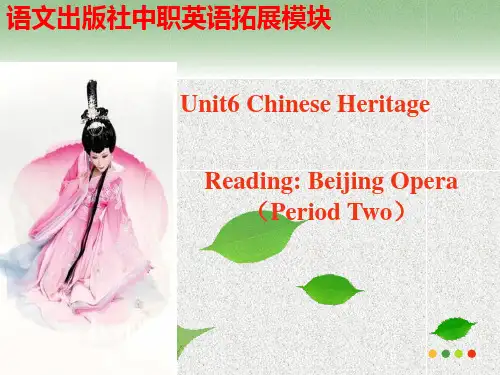


2019-2020年语文版中职英语(拓展模块)Unit 6《ChineseHeritage》word教案语文出版社中职英语拓展模块Unit6 Chinese HeritageReading: Beijing Opera (Period Two)教学设计2016年8月14日Unit 6 Reading Beijing Opera 教学设计一、教学内容分析本课选自语文出版的中等职业教育课程改革国家规划新教材全国中等职业教育教材审定委员会审定《英语(拓展模块)》Unit 6 National treasures Reading。
是满足中职学生个性发展和继续升学需要选修的公共基础英语教学内容。
主要围绕Beijing Opera这一话题展开的,讲述了京剧的历史、特点、角色、象征、名角名家等,为中职生了解、学习、传扬中国传统文化艺术提供了良好的契机。
新课程标准强调英语教学要从学生的生活经验和认知水平、兴趣出发,倡导体验,实践、参与、合作与交流的学习方式和任务型教学途径,发展学生的综合运用能力。
作为一单元的核心和基础部分,本节教学重点是提高学生阅读能力及如何通过阅读获得知识、运用知识的能力。
因本课文较长,内容较为深奥,在有限的时间内,如何在以阅读为主的教学过程中引导学生学习语言知识并运用这些知识进行语言交际、交流成为本课的难点。
为此教师要在教学中把握重点,突破难点,为下面的Speaking and Speaking和Writing部分提供语言输入,奠定了内容基础和能力基础。
二、教学目标分析根据教学大纲的要求以及授课对象确定教学目标如下:1.知识与技能目标(1). 在学习和掌握30个hot words and 10个useful expressions 的用法基础上,通过阅读从历史、特点、角色等五个方面了解京剧,引导学生理解、感悟京剧艺术。
(2).逐步提高阅读能力和交流沟通能力;培养学生对京剧的欣赏能力。
2. 情感与态度目标(1).通过课堂教学音频、视频欣赏、文本阅读、课堂练习,学生们了解,并喜欢聆听和观看京剧,陶冶情操,增强艺术民族自豪感。
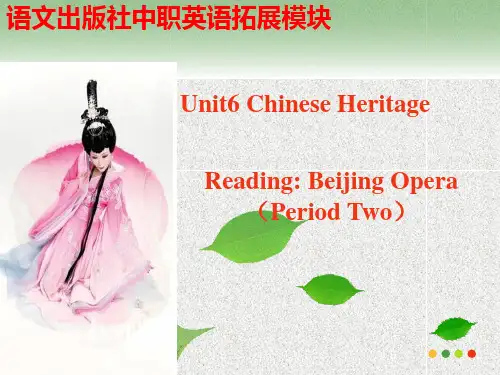
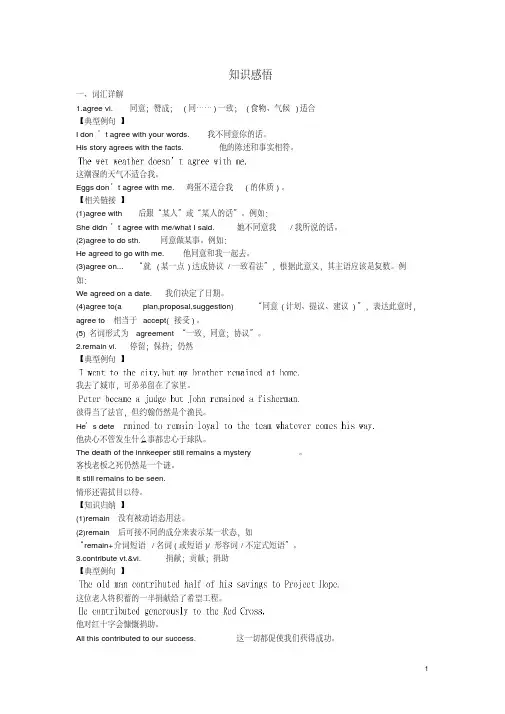
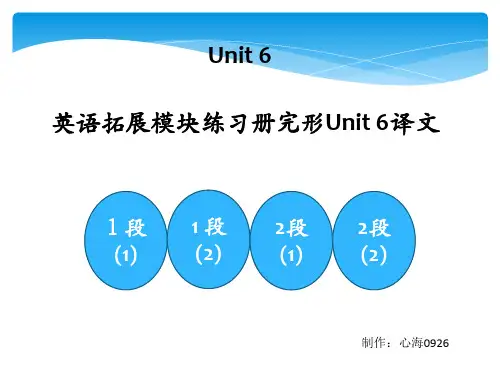
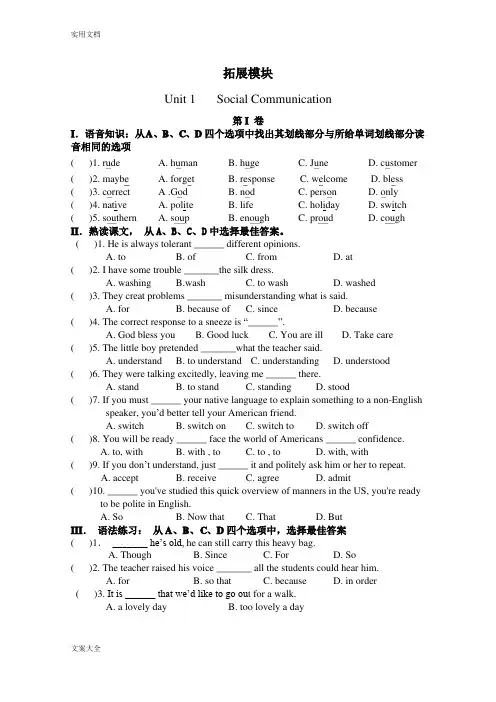
拓展模块Unit 1Social Communication第I卷I.语音知识:从A、B、C、D四个选项中找出其划线部分与所给单词划线部分读音相同的选项()1. rude A. human B. huge C. June D. customer()2. maybe A. forget B. response C. welcome D. bless ()3. correct A .God B. nod C. person D. only()4. native A. polite B. life C. holiday D. switch ()5. southern A. soup B. enough C. proud D. cough II.熟读课文,从A、B、C、D中选择最佳答案。
()1. He is always tolerant ______ different opinions.A. toB. ofC. fromD. at()2. I have some trouble _______the silk dress.A. washingB.washC. to washD. washed()3. They creat problems _______ misunderstanding what is said.A. forB. because ofC. sinceD. because()4. The correct response to a sneeze is“______”.A. God bless youB. Good luckC. You are illD. Take care()5. The little boy pretended _______what the teacher said.A. understandB. to understandC. understandingD. understood()6. They were talking excitedly, leaving me ______ there.A. standB. to standC. standingD. stood()7. If you must ______ your native language to explain something to a non-English speaker, you’d better tell your American friend.A. switchB. switch onC. switch toD. switch off()8. You will be ready ______ face the world of Americans ______ confidence.A. to, withB. with , toC. to , toD. with, with()9. If you don’t understand, just ______ it and politely ask him or her to repeat.A. acceptB. receiveC. agreeD. admit()10. ______ you've studied this quick overview of manners in the US, you're ready to be polite in English.A. SoB. Now thatC. ThatD. ButIII.语法练习:从A、B、C、D四个选项中,选择最佳答案()1._______ he’s old, he can still carry this heavy bag.A. ThoughB. SinceC. ForD. So()2. The teacher raised his voice _______ all the students could hear him.A. forB. so thatC. becauseD. in order()3.It is ______ that we’d like to go ou t for a walk.A. a lovely dayB. too lovely a dayC. so lovely a dayD. such lovely a day()4. Mary had ______ much work to do that she stayed at her office all day.A. suchB. soC. tooD. very()5. _____ she goes, there are crowds of people waiting to see her.A. WhereverB. HoweverC. WhicheverD. Whoever()6. You must speak louder ______ you can be heard by all.A. so thatB. in order toC. becauseD. such that()7. ______ well you can drive, you must drive carefully.A. So long asB. In order thatC. No matter howD. The moment()8. If we work with a strong will, we can overcome any difficulty, ____great it is.A. whatB. howC. whateverD. however()9._______ he’s very young, _______ he knows several languages.A. Though, butB. Because, soC. Though, /D. Because, / ()10. _____ I suggest, he always disagrees.A. HoweverB. WhateverC. WhicheverD. WhoeverIV.完形填空:Last summer, my wife Jane and I went to visit the town where we both grew up. We 1there since we were married ten years ago.2,we went to the neighborhood where my wife spent her childhood.It hadn’t changed very much. The house3she was born was still there, but it was now a different color. The same neighbors still lived next door. They were very glad to 4Jane, and asked us to come in and have a cup of coffee. We learned about all the neighbors, old and new. Jane had a very good5. As fast as one question was answered, she would ask the next. “What happened6the Dunbars who used to have the little yellow house on the corner?”,“Who bought the old Johnson place in the next block?”,“Do Fred and Martha still live down the street?”,“What about Miss Burton who7in that extremely big house around the corner?”Then we went to see the neighborhood where I grew up. What a8! It was all changed. All the old houses I remembered were9and in their place were some very modern ones. I didn’t know any of the people who10there.() 1.A. hadn’t been B. wasn’t C. haven’t been D. didn’t be() 2. A. At the very beginning B. First C. Firstly D. For the first time() 3. A. that B. / C. where C. which() 4. A. find B. know C. meet D. see() 5.A. time B. ask C. home D. question() 6. A. with B. to C. for D. about() 7. A. live alone B. lives lonely C. lived alone D. stayed lonely() 8. A. disappoint B. disappointing C. disappointed D. disappointment () 9.A. gone B. ruins C. there D. the same() 10. A. worked B. stayed C. studied D. livedV.阅读理解AEducation for Japanese children is free for the first nine years and all children must go to school six years of primary schooling and three years of secondary schooling. In the primary and secondary schools,about99.9per cent of school-age children are present. School usually begins at 8 o'clock in the morning and ends at 3 o'clock in the afternoon on weekdays and at noon on Saturdays. The school begins in April and ends in March. There is a summer holiday in August and a winter holiday during the New Year season.After nine years of schooling,students can enter the three-year high school by passing an examination and by paying a small charge each year.After high school, students can go on to study at various types of colleges, usually for four years. There are also two-year junior colleges.() 1. The passage mainly discusses about ______.A.colleges in JapanB.free education in Japancation in Jap anD.school time in Japan() 2. How many days have the Japanese students to go to school every week?A.Not known.B.Four and half days.C.Five days.D.Five and a half days.() 3. If a student wants to go to a high school in Japan, he or she must ______.A.pay a large amount of moneyB.study at primary and secondary school for 9 yearsC.take part in (参加) the exam and pay a little moneyD.pass the exam and pay a little money() 4. What is mentioned in the passage?A.Types of colleges.B.Perio ds for different schoolings.C.The teaching staff (教职员工).D.The number of children attending schools.() 5. According to the passage what is true?A.Almost all Japa nese children have school education.B.Japanese schools have three vacationsC.Japanese children have freedom to choose schools.D.Weekdays are from Monday to Sunday.BFrom a plane we can see the fields, cities, mountains or seas below. If we go intospace, we see more and more of the earth. People and man-made satellites have been sent out into space to look at the earth carefully and people have learnt more about the earth in the last few years.The sea looks very beautiful when the sun is shining on it.But it can be very terrible when there is a strong wind.The sea is very big. It nearly covers three quarters of the earth. The sea is also very deep in some places. There is one place and at that place the sea is about 11 kilometers deep. The highest mountain in the world is about9 kilometers high.If that mountain was put into the sea at that place, there would be still 2 kilometers of water above it!In most parts of the sea, there are many kinds of fishes and plants. Some live near the top of the sea. Others live deep down. There are also a lot of small living things, and lots of fishes live by eating them.The sea can be very cold.When people go down,the sea becomes colder and colder.Only some men can go down into the deep sea.But,in1970,five women scientists (科学家) lived in the deep sea for fourteen days.()6. This passage is_________.A. a short storyB. for science readingC. a piece of newsD. a report()7. The sea covers about _______of the earth.A One third B. One fourthC. Two quartersD. Three fourths()8. _______are not mentioned (提及) in this passage.A. IslandsB. FishesC. PlantsD. Living things()9. Which of the following is NOT true?A. The sea is usually beautiful when the sun is shining.B. The sea is always very terrible when the wind blows hard.C. The highest mountain is in the deepest place of the sea.D. The deeper the people go into the sea, the colder they will feel.()10. The last sentence “But, in 1970, five women scientists live d in the deep sea for fourteen days.” means that________.A. women wanted to live in the deep sea for a long timeB. women could go deeper into the sea than menC. women liked living in the deep sea better than menD. women could do the same work as men第II卷I.单词拼写:根据下列句子及所给汉语注释,在横线上写出单词的正确形式1. No matter what we said, he______(假装)that he knew nothing about it.2. The ________(观众) enjoyed every minute of the performance.3. The naughty boy ________(承认)that did it with his father’s help.4. Sorry,I can’t __________(解释)why I am engaged in that job.5. The best way to practice English is to talk with a _________(本国的) speaker. II.词形变换:用括号内单词的适当形式填空1.I became________(annoy)when I felt that he pretended to understand what Imeant.2.He _____(polite)asked the man to give a correct response.3.Work hard and you’ll have _________ (confident ) to face the challenge of life.4.The boy felt _____(lose)when he heard something he didn’t understand.5.She created some problems because of _______(misunderstand) what her boss said. III.词义搭配:从B栏中选出A栏单词的正确解释A B() 1.tolerant A. man, woman or child, not an animal() 2. rude B. say or do something again() 3. native C. sudden burst of air from the nose and mouth() 4. repeat D. accepting what one doesn’t like() 5. human E. belonging to or being the place of one’s birth() 6. conversation F. fit, right() 7. admit G. informal talk() 8. sneeze H. agree to the truth of usually something bad() 9. suitable I. an answer or an action done in answer() 10. response J. not politeIV.补全对话。
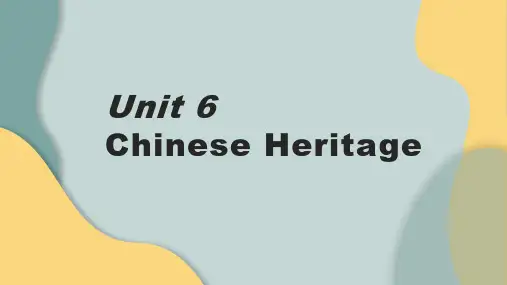
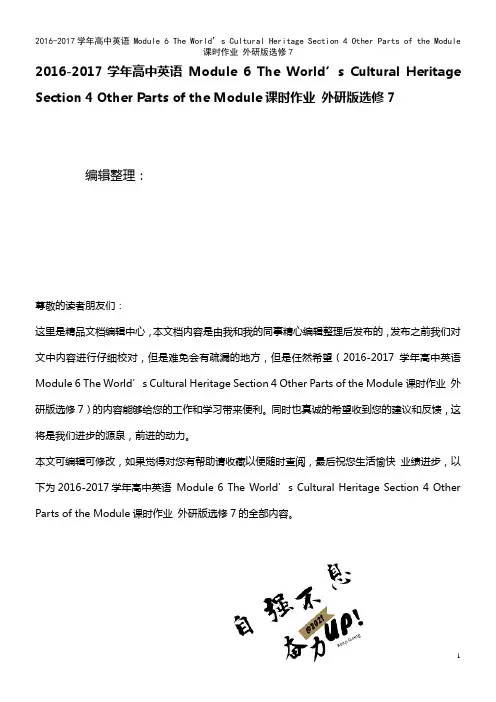
2016-2017学年高中英语Module 6 The World’s Cultural Heritage Section 4 Other Parts of the Module课时作业外研版选修7编辑整理:尊敬的读者朋友们:这里是精品文档编辑中心,本文档内容是由我和我的同事精心编辑整理后发布的,发布之前我们对文中内容进行仔细校对,但是难免会有疏漏的地方,但是任然希望(2016-2017学年高中英语Module 6 The World’s Cultural Heritage Section 4 Other Parts of the Module课时作业外研版选修7)的内容能够给您的工作和学习带来便利。
同时也真诚的希望收到您的建议和反馈,这将是我们进步的源泉,前进的动力。
本文可编辑可修改,如果觉得对您有帮助请收藏以便随时查阅,最后祝您生活愉快业绩进步,以下为2016-2017学年高中英语Module 6 The World’s Cultural Heritage Section 4 Other Parts of the Module课时作业外研版选修7的全部内容。
Module 6 The World’s Cultural HeritageSection ⅣOther Parts of the ModuleⅠ.单词拼写1.Your technical________(援助) in the project is greatly appreciated.答案:assistance2.I was________(感到荣幸) to have been mentioned in his speech。
答案:honoured3.Several companies are________(竞标) for the contract to build the bridge。
答案:bidding4.She never speaks ill of anyone in his or her____________(缺席,不在).答案:absence5.Progress has been made towards a political________(折中) between the two nations.答案:compromise6.I don’t________(拥护) building large factories in this area.答案:advocate7.I was looking forward to working under her expert____________(指导).答案:guidance8.The doctor gave him a very________(彻底的) check。
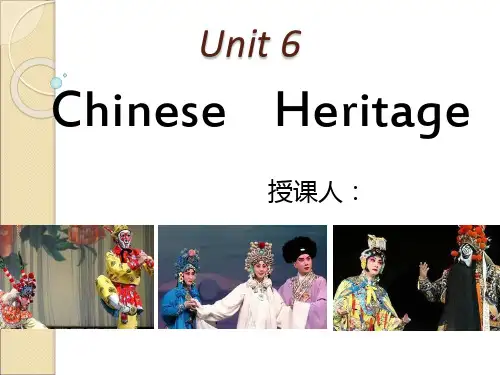
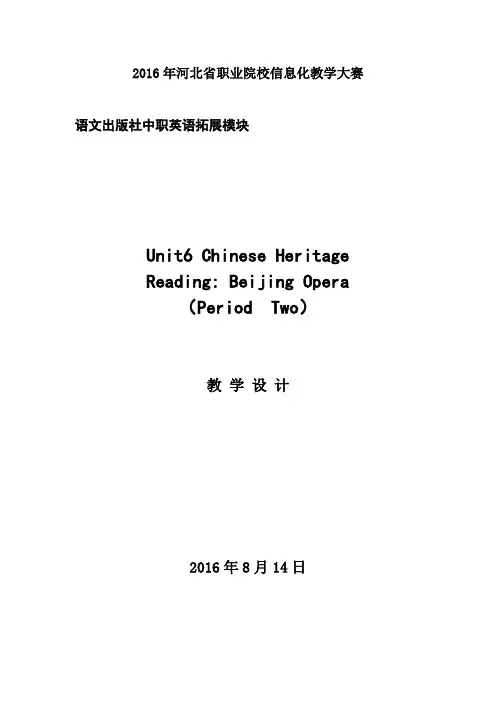
2016年河北省职业院校信息化教学大赛语文出版社中职英语拓展模块Unit6 Chinese HeritageReading: Beijing Opera (Period Two)教学设计2016年8月14日Unit 6 Reading Beijing Opera 教学设计一、教学内容分析本课选自语文出版的中等职业教育课程改革国家规划新教材全国中等职业教育教材审定委员会审定《英语(拓展模块)》Unit 6 National treasures Reading。
是满足中职学生个性发展和继续升学需要选修的公共基础英语教学内容。
主要围绕Beijing Opera这一话题展开的,讲述了京剧的历史、特点、角色、象征、名角名家等,为中职生了解、学习、传扬中国传统文化艺术提供了良好的契机。
新课程标准强调英语教学要从学生的生活经验和认知水平、兴趣出发,倡导体验,实践、参与、合作与交流的学习方式和任务型教学途径,发展学生的综合运用能力。
作为一单元的核心和基础部分,本节教学重点是提高学生阅读能力及如何通过阅读获得知识、运用知识的能力。
因本课文较长,内容较为深奥,在有限的时间内,如何在以阅读为主的教学过程中引导学生学习语言知识并运用这些知识进行语言交际、交流成为本课的难点。
为此教师要在教学中把握重点,突破难点,为下面的Speaking and Speaking和Writing部分提供语言输入,奠定了内容基础和能力基础。
二、教学目标分析根据教学大纲的要求以及授课对象确定教学目标如下:1.知识与技能目标(1). 在学习和掌握30个hot words and 10个useful expressions 的用法基础上,通过阅读从历史、特点、角色等五个方面了解京剧,引导学生理解、感悟京剧艺术。
(2).逐步提高阅读能力和交流沟通能力;培养学生对京剧的欣赏能力。
2. 情感与态度目标(1).通过课堂教学音频、视频欣赏、文本阅读、课堂练习,学生们了解,并喜欢聆听和观看京剧,陶冶情操,增强艺术民族自豪感。
拓展模块Unit 1 Social Communication第I 卷I.语音知识:从A、B、C、D四个选项中找出其划线部分与所给单词划线部分读音相同的选项( )1. rude A. human B. huge C. June D. customer ( )2. maybe A. forget B. response C. welcome D. bless ( )3. correct A .God B. nod C. person D. only ( )4. native A. polite B. life C. holiday D. switch ( )5. southern A. soup B. enough C. proud D. cough II.熟读课文,从A、B、C、D中选择最佳答案。
( )1. He is always tolerant ______ different opinions.A. toB. ofC. fromD. at( )2. I have some trouble _______the silk dress.A. washingB.washC. to washD. washed( )3. They creat problems _______ misunderstanding what is said.A. forB. because ofC. sinceD. because( )4. The correct response to a sneeze is “______”.A. God bless youB. Good luckC. You are illD. Take care ( )5. The little boy pretended _______what the teacher said.A. understandB. to understandC. understandingD. understood( )6. They were talking excitedly, leaving me ______ there.A. standB. to standC. standingD. stood( )7. If you must ______ your native language to explain something to a non-English speaker, you’d better tell your American friend.A. switchB. switch onC. switch toD. switch off( )8. You will be ready ______ face the world of Americans ______ confidence.A. to, withB. with , toC. to , toD. with, with( )9. If you don’t understand, just ______ it and politely ask him or her to repeat.A. acceptB. receiveC. agreeD. admit( )10. ______ you've studied this quick overview of manners in the US, you're ready to be polite in English.A. SoB. Now thatC. ThatD. ButIII.语法练习:从A、B、C、D四个选项中,选择最佳答案( )1._______ he’s old, he can still carry this heavy bag.A. ThoughB. SinceC. ForD. So( )2. The teacher raised his voice _______ all the students could hear him.A. forB. so thatC. becauseD. in order( )3. It is ______ that we’d like to go ou t for a walk.A. a lovely dayB. too lovely a dayC. so lovely a dayD. such lovely a day( )4. Mary had ______ much work to do that she stayed at her office all day.A. suchB. soC. tooD. very( )5. _____ she goes, there are crowds of people waiting to see her.A. WhereverB. HoweverC. WhicheverD. Whoever ( )6. You must speak louder ______ you can be heard by all.A. so thatB. in order toC. becauseD. such that ( )7. ______ well you can drive, you must drive carefully.A. So long asB. In order thatC. No matter howD. The moment( )8. If we work with a strong will, we can overcome any difficulty, ____great it is.A. whatB. howC. whateverD. however ( )9. _______ he’s very young, _______ he knows several languages.A. Though, butB. Because, soC. Though, /D. Because, / ( )10. _____ I suggest, he always disagrees.A. HoweverB. WhateverC. WhicheverD. WhoeverIV. 完形填空:Last summer, my wife Jane and I went to visit the town where we both grew up. We1 there since we were married ten years ago.2 , we went to the neighborhood where my wife spent her childhood. It hadn’t changed very much. The house3 she was born was still there, but it was now a different color. The same neighbors still lived next door. They were very glad to4 Jane, and asked us to come in and have a cup of coffee. We learned about all the neighbors, old and new. Jane had a very good5 . As fast as one question was answered, she would ask the next. “What happened6 the Dunbars who used to have the little yellow house on the corner?”, “Who bought the old Johnson place in the next block?”, “Do Fred and Martha still live down the street?”, “What about Miss Burton who7 in that extremely big house around the corner?”Then we went to see the neighborhood where I grew up. What a 8 ! It was all changed. All the old houses I remembered were 9 and in their place were some very modern ones. I didn’t know any of the people who 10 there.( ) 1. A. hadn’t been B. wasn’t C. haven’t been D. didn’t be( ) 2. A. At the very beginning B. First C. Firstly D. For the first time ( ) 3. A. that B. / C. where C. which( ) 4. A. find B. know C. meet D. see( ) 5. A. time B. ask C. home D. question( ) 6. A. with B. to C. for D. about( ) 7. A. live alone B. lives lonely C. lived alone D. stayed lonely( ) 8. A. disappoint B. disappointing C. disappointed D. disappointment ( ) 9. A. gone B. ruins C. there D. the same( ) 10. A. worked B. stayed C. studied D. livedV. 阅读理解AEducation for Japanese children is free for the first nine years and all children must go to school six years of primary schooling and three years of secondary schooling. In the primary and secondary schools, about 99.9 per cent of school-age children are present. School usually begins at 8 o'clock in the morning and ends at 3 o'clock in the afternoon on weekdays and at noon on Saturdays. The school begins in April and ends in March. There is a summer holiday in August and a winter holiday during the New Year season.After nine years of schooling, students can enter the three-year high school by passing an examination and by paying a small charge each year. After high school, students can go on to study at various types of colleges, usually for four years. There are also two-year junior colleges.( ) 1. The passage mainly discusses about ______.A.c olleges in JapanB.free education in Japancation in Jap anD.s chool time in Japan( ) 2. How many days have the Japanese students to go to school every week?A.N ot known.B.Four and half days.C.Five days.D.F ive and a half days.( ) 3. If a student wants to go to a high school in Japan, he or she must ______.A.p ay a large amount of moneyB.study at primary and secondary school for 9 yearsC.take part in (参加) the exam and pay a little moneyD.p ass the exam and pay a little money( ) 4. What is mentioned in the passage?A.T ypes of colleges.B.Perio ds for different schoolings.C.The teaching staff (教职员工).D.T he number of children attending schools.( ) 5. According to the passage what is true?A.A lmost all Japa nese children have school education.B.Japanese schools have three vacationsC.Japanese children have freedom to choose schools.D.W eekdays are from Monday to Sunday.BFrom a plane we can see the fields, cities, mountains or seas below. If we go intospace, we see more and more of the earth. People and man-made satellites have been sent out into space to look at the earth carefully and people have learnt more about the earth in the last few years.The sea looks very beautiful when the sun is shining on it. But it can be very terrible when there is a strong wind.The sea is very big. It nearly covers three quarters of the earth. The sea is also very deep in some places. There is one place and at that place the sea is about 11 kilometers deep. The highest mountain in the world is about 9 kilometers high. If that mountain was put into the sea at that place, there would be still 2 kilometers of water above it!In most parts of the sea, there are many kinds of fishes and plants. Some live near the top of the sea. Others live deep down. There are also a lot of small living things, and lots of fishes live by eating them.The sea can be very cold. When people go down, the sea becomes colder and colder. Only some men can go down into the deep sea. But, in 1970, five women scientists (科学家) lived in the deep sea for fourteen days.()6. This passage is_________.A. a short storyB. for science readingC. a piece of newsD. a report()7. The sea covers about _______of the earth.A One third B. One fourthC. Two quartersD. Three fourths()8. _______are not mentioned (提及) in this passage.A. IslandsB. FishesC. PlantsD. Living things()9. Which of the following is NOT true?A. The sea is usually beautiful when the sun is shining.B. The sea is always very terrible when the wind blows hard.C. The highest mountain is in the deepest place of the sea.D. The deeper the people go into the sea, the colder they will feel.()10. The last sentence “But, in 1970, five women scientists live d in the deep sea for fourteen days.” means that________.A. women wanted to live in the deep sea for a long timeB. women could go deeper into the sea than menC. women liked living in the deep sea better than menD. women could do the same work as men第II卷I.单词拼写:根据下列句子及所给汉语注释,在横线上写出单词的正确形式1. No matter what we said, he ______(假装)that he knew nothing about it.2. The ________( 观众) enjoyed every minute of the performance.3. The naughty boy ________(承认)that did it with his father’s help.4. Sorry,I can’t __________(解释)why I am engaged in that job.5. The best way to practice English is to talk with a _________( 本国的) speaker. II.词形变换:用括号内单词的适当形式填空1.I became ________(annoy) when I felt that he pretended to understand what Imeant.2.He _____(polite)asked the man to give a correct response.3.Work hard and you’ll have _________ (confident ) to face the challenge of life.4.The boy felt _____ (lose)when he heard something he didn’t understand.5.She created some problems because of _______(misunderstand) what her boss said. III.词义搭配:从B栏中选出A栏单词的正确解释A B( ) 1.tolerant A. man, woman or child, not an animal( ) 2. rude B. say or do something again( ) 3. native C. sudden burst of air from the nose and mouth ( ) 4. repeat D. accepting what one doesn’t like( ) 5. human E. belonging to or being the place of one’s birth ( ) 6. conversation F. fit, right( ) 7. admit G. informal talk( ) 8. sneeze H. agree to the truth of usually something bad ( ) 9. suitable I. an answer or an action done in answer( ) 10. response J. not politeIV.补全对话。
中等职业学校英语拓展模块Unit6作者及工作单位王蕊北京新城职业学校一.教材分析本课是中等职业学校拓展模块Unit6 Keeping Fit第一课时。
本单元的中心话题是危害健康的各种疾病和如何保持健康,本课时是要掌握生活习惯和健康的关系,哪些是好的,对健康有益的生活习惯,哪些不好的,对健康有危害的生活习惯,不好的怎么来改正。
主要语言结构为:情态动词should和should not是本节重点,要求学生能够用should和should not 给他人提建议。
通过本课的学习进一步培养学生养成良好的生活习惯和保持健康的重要性的意识。
二.学情分析我教学的对象是中职二年级的学生,学生一小部分基础属于中上水平,中下水平的占了相当一部分,他们学习英语既感到好奇又担忧,希望能得到他人的肯定。
因此我在教学活动中尽量让他们参与到活动中来,有更多的机会来说英语,减少他们的恐惧感,通过学生间的合作学习,降低他们的学习难度,使他们体验到成功的喜悦。
同时自主学习和小组交流中加以落实,提高他们综合运用语言的能力,使各层次的学生都有所收获。
三.教学目标1.知识目标:1)词汇: 学生能够识读balanced、gym、overweight、fitness、junk、lung cancer,、tobacco、appetite等词汇。
2) 句型: 学生会使用You should/ shouldn’t… 的句型给别人建议。
2.语言技能目标:学生能简单使用所学句型给别人关于如何保持身体健康的一些建议,并通过此课程为自己设立一个健康的生活计划。
3.情感态度目标:1)培养学生对生活的热爱,养成良好的生活习惯。
2)能通过自己的知识帮助别人,培养学生的自信心。
四.教学重点和难点教学重点:词汇、词组搭配和句型的运用。
教学难点:You should/ shouldn’t…/You may not…/You are not to…/You may begin to…等句型的学习,并能在实际情景中简单地运用以上句型来给别人建议。
Unit 6一、单项选择,从A、B、C、D 四个选项中,选出可以填入空白处的最佳选项。
(共10小题,每小题1分,共10分)1. People in summer in this river which is so dirty now.A. used to swimB. are used to swimmingC. were used to swimD. used to swimming2. Thomas got the first place in the math competition, made his mother very proud.A.itB. thatC. thisD. which3. All the team members attend the regular meeting.A. requestedB. are requested toC. requireD. requested to4. Mary’s suffering ill health at the moment.A. fromB. toC. /D. on5. I can’t decide .A. to buy which oneB. which one to buyC. to buy whichD. which to buy one6. All the students should arrive at school . .A. at timesB. on timeC. in timeD. at time7. I warned you home alone.A. not walkingB. walkingC. to walkD. not to walk8. Although she didn’t mention any names, we all knew who she .A. referred toB. mentionedC. referredD. led to9. I found Tom behind the door.A. hiddenB. to hideC. hidingD. hides10. They had to the football match as the ground was too wet to play on.A. put onB. put offC. put downD. put up二、用所给单词的正确形式填空。
Unit 6 C hinese HeritageI. :找出划线部分与所给单词划线部分读音相同的选项( )bine A. solve B. opera C. convey D. local( )2. scholar A. character B. China C. charming D. reach ( )3. theme A .the B. thus C. author D. rhythm ( )4. pulse A. mutual B. include C. costume D. drug ( )5. country A. courage B. announce C. loud D. ground II.单选( ) 1. Beijing Opera has nothing _____ the opera of the West.A. in common asB. common withC. in common with D .on common to( ) 2. Beijing Opera _____ the late 18th century.A. originates fromB. originated fromC. is origianted inD. origianted in( ) 3. The movie _____ a true story happened in the late 19th century.A.based onB.is based toC. based toD.is based on( ) 4. Sheng are the_____ male actors who portray scholars, officials, warriors, etc.A.leadB.leadingC. leaderD. led( ) 5. _____ a foot means going through a doorway in Beijing Opera.A. To liftB. LiftC.LiftingD.lifted( ) 6. _____ his hard work, he made it at last.A. As a resultB. As the resultC. As the result ofD. As a result of( ) 7. This custom ______ the 11th century.A. dates backB. dates back toC. dates toD. dates from( ) 8. This area is______ three parts.A. divided intoB. divided byC. divided withD. divided of( ) 9. Our group ________ three drivers, five nurses and two doctors.A.is made ofB.is made up ofC.are made up ofD.are made of( ) 10. ____ artists are working for the peformance and ____ them are female.A.Two hundreds of; hundredsB. Two hundreds; hundreds ofC. Two hundred;hundreds ofD. Two hundred of; hundreds of()11. If you keep _____ English, you canlearn English well.A. practicing speakB. practicing speakingC. practicing to speakD. to practicing spoken( )12. She can’t help ____ the house because she’s busy making a cake.A. to cleanB. cleaningC. cleanedD. being cleaned( )13. She can’t help ____ a cake, because she loves eating cakes.A. to makeB. makingC. madeD. being made( )14. — What do you think of the book?—Oh, excellent. It’s worth _____ a second time.A. to readB. readingC. to be readD. being read( )15.Mrs.Smith warned her husband_____after drinking again and again.A.never to driveB.to never driveC.never drivingD.never drive ( )16.I can’t imagine_____th at with such a famous author.A.workB.to workC.to be workingD.working( )17.We agreed _____ here but so far she hasn’t turned up yet.A. having metB. meetingC. to meetD. to have met( )18. --- Would you mind _______ for a few minutes?--- No, not at all.A. waitB. to waitC. waitedD. waiting( )19.At last, he decided ___ his mother to the hospital.A. takeB. tookC. to takeD. taking( )20.My mother always tells me ___ there.A. not goB. not to goC. goD. don’t go( )21. I have finished ____ two English novels since last Sunday.A. to readB. readC. readingD. to reading( )22.People couldn’t help _____after they heard the funny story.A. laughB. to laughC. laughingD. to laughing( )23. I expected ___your friend, but my car broke down on the way.A. I’ll meetB. meetingC. to meetD. to meeting( )24. He suggested ____ a party to celebrate his birthday.A. to haveB. haveC. havingD. had( )25. If you determine____ , I think you can make it.A. to give up to smokeB. to give up smokingC. giving up smokingD. giving up to smokeIV. 完形填空:When Jones finished her studies, she decided to travel around the world. She wanted to see as many foreign__1__ as she could while she was young. She first went to Latin America and __2__ as an English teacher in a school in Bolivia. Jones spoke a little Spanish, so she was __3__ to let her students understand what she meant even when they didn’t know much English. She told her students if anyone dreamed in English, he had __4__ it very well.One day, one student came up and told her in Spanish that he had not done his English homework. He had gone to bed early, but __5__ badly.“What does this have to do with your __6__?” Jones asked.“I dreamed all night, and my dream is in English!”“Well, tell me about your dream.”“All the people in my dream __7__ English,” the student said. “____8__ all the signs were in English.”“But that’s wonderful,” said Jones. “__9__did all the people say to you?”“I am sorry, Miss Jones. That’s why I didn’t sleep well. I didn’t __10__ a word they said. It was a nightmare (噩梦)!”()1. A. films B. places C. friends D. doctors()2. A. failed B. showed C. studied D. worked()3. A. afraid B. angry C. able D. sorry()4. A. learnt B. dreamed C. grown D. worked()5. A. studied B. slept C. spoke D. learnt()6. A. homework B. family C. classmates D. school()7. A. studied B. hated C. spoke D. liked()8.. A. But B. And C. Because D. Though()9. A. Why B. How C. What D. Where()10. A. hear B. write C. spell D. knowV. 阅读理解:AElizabeth Blackwell was born in England in 1821, and moved to New York City when she was ten years old. One day she decided that she wanted to become a doctor. That was nearly impossible for awoman in the middle of the nineteenth century. After writing many letters asking for admission(录取) to medical schools, she was finally accepted by a doctor in Philadelphia. She was so determined that she taught school and gave music lessons to get money for the cost of schooling.In 1849, after graduation from medical school,she decided to further her education in Paris. She wanted to be a surgeon(外科医师) , but a serious eye problem forced her to give up the idea.Upon returning to the United States, she found it difficult to start her own practice because she was a woman. By 1857 Elizabeth and her sister, also a doctor, along with another woman doctor, managed to open a new hospital, the first for women and children. Besides being the first woman physician and founding her own hospital, she also set up the first medical school for women.()1. Why couldn’t Elizabeth Blackwell realize her dream of becoming a surgeon?A. She couldn’t get admitted to medical schoolB. She decided to further her education in ParisC. A serious eye problem stopped herD. It was difficult for her to start a practice in the United States()2. What main obstacle(障碍) almost destroyed Elizabeth’s chances for becoming for a doctor?A. She was a woman.B. She wrote too many letters.C. She couldn’t graduate from medical school.D. She couldn’t set up her hospital.()3. How many years passed between her graduation from medical school and the opening of her hospital?A. Eight yearsB. Ten yearsC. Nineteen yearsD. Thirty-six years()4. According to the passage, all of the following are “firsts” in the life of Elizabeth Blacekwell, except that she ______.A. became the first woman physicianB. was the first woman doctorC. and other women founded the first hospital for women and childrenD. set up the first medical school for women()5. Eilzabeth Blackwell spent most of her lift in _______.A. EnglandB. ParisC. the United StatesD. New York CityBWe know that many animals do not stay in one place. Birds, fish and other animals move from one place to another at a certain time. They move for different reasons: most of them move to find food more easily, but others move to get away from places that are too crowded. When cold weather comes, many birds move to warmer places to find food. Some fishes give birth in warm water and move to cold water to feed. The most famous migration (迁移) is probably the migration of fish, which is called "salmon". This fish is born in fresh water but it travels many miles to salt water. There it spends its life. When it is old, it returns to its birthplace in fresh water. Then it gives birth and dies. In northern Europe, there is a kind of mouse. They leave their mountain homes when they become too crowded. They move down to the low land. Sometimes they move all the way to the seaside, and many of them are killed when they fall into the sea.Recently (近来), scientists have studied the migration of a kind of lobster (龙虾). Every year, when the season of the bad weather arrives, the lobsters get into a long line and start to walk across the floor of the ocean. Nobody knows why they do this, and nobody knows where they go.So, sometimes we know why humans and animals move from one place to another, but at other times we don't. Maybe living things just like to travel.( )6. Most animals move from one place to another at a certain time to _____.A.give birthB. enjoy warmer weatherC. find food more easilyD. find beautiful places( )7. The fish called "salmon" spends a long time in ____.A. salt waterB. riversC. fresh waterD. its birthplace( )8. The mice in northern Europe move when _____.A. they give birthB. the place gets too crowdedC. the weather is badD. they haven't enough food( )9. The lobsters move _____.A. to the fresh waterB. at a certain timeC. to the underseaD. to find more food( )10. What is the main idea of the passageA.Animals move to find food more easily.B.The migration of the fish called "salmon" is the most famous migration.C.Living things move from one place to another because they like to travel.D. Sometimes we know why and how living things move from one place to another, butsometimes we don't.。